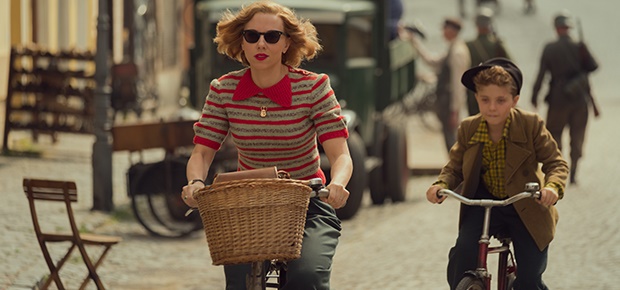
WHAT IT'S ABOUT:
A lonely German boy named Jojo’s world view is turned upside-down when he discovers that his single mother is hiding a young Jewish girl in their attic. Aided only by his idiotic imaginary friend, Adolf Hitler, Jojo must confront his own blind nationalism.
WATCH THE TRAILER HERE:
As impossible pitches go, it's hard to beat "the comedic adventures of a young Hitler Youth boy and his imaginary friend, Adolf Hitler". It's a bonkers idea that should be the cinematic equivalent of Springtime For Hitler but even less likely. It should be grossly offensive, horribly misjudged and just plain awful on every conceivable level. That its none of these things is a major miracle in and of itself. That it was made in the first place is something akin to the splitting of the Red Sea. That it is an absolute, stone-cold classic that is both hilarious and heartbreakingly beautiful is... well, that's just pure Taika Waititi.
The inordinately talented writer/director/actor/rock-alien ruled the indie scene with cult classics like What We Do In The Shadows and Hunt For the Wilderpeople before hitting the big-time with his wonderfully mad contribution to the Marvel Cinematic Universe, Thor: Ragnorok, and I can't imagine any other modern filmmaker but Taika pulling off something as batpoo insane as Jojo Rabbit.
To be sure, several critics (UK-based ones in particular, weirdly) have compellingly argued that even critical-favourite, Takia Waititi, wasn't able to make that deranged premise work. "Compellingly" doesn't mean "rightly", though. And even if their problems with the film actually have little to do with it being offensive, I can't even begin to imagine how anyone with even the slightest appreciation for quirk wouldn't be won over by Jojo Rabbit. It's not just that he makes the premise work, it's that he turns something so potentially tasteless into something so effortlessly entertaining, so consistently funny and so massively good-hearted.
Jojo Rabbit is not, by any means, a cutting satire on Nazism and it certainly doesn't dwell of the horrors of the Holocaust, which is clearly what several critics were expecting it to be. Rather than weaknesses, though, it's precisely these sorts of decisions that demonstrate Taika's ultimate mastery of the material – which he adapted extremely loosely from the apparently much more straightforward and solemn book by Christine Leunens.
He clearly assumes that most of us are familiar with the unspeakable horrors of the Holocaust and the pure, simple evil of the Nazi party, so instead of making "just another" Holocaust film, he uses that shared knowledge to punctuate the story that he's actually trying to tell: that of a brainwashed young boy overcoming his prejudices by tapping into his underlying humanity and recognising the humanity, not just in others, but in "the other". I suppose that actually makes it the very definition of an "(anti-)Holocaust film" but, more than anything, it's an exquisitely told fable (just look at that title!) whose arrival could not be timelier.
Perhaps the greatest feat in a film filled with amazing, seemingly impossible feats, is the way that Taika uses the comedy to accentuate the emotional heft of both its most uplifting and its most upsetting scenes. The tonal shifts in Jojo Rabbit are massive, but where most lesser filmmakers are often undone by such severe gear changes between comedy, tragedy and genuine beauty, Taika Waititi thrives on them and uses each to inform the others.
While 99% of the film's success comes down to its director/writer, he's certainly not alone in making the film the triumph that it is. Taika specifically wanted the film to be colourful and vibrant to better reflect what life actually looked like in Germany during most of World War II, while also reflecting the youthful, lively viewpoint of his young protagonist. Everything from the production design to the costuming to the cinematography by Mihai Malaimare Jr. brings that vision to life. There's definitely something of Wes Anderson in the way the film looks and, considering just how meticulous Anderson's own productions are, that's really saying something.
Perhaps the scene that best encapsulates the singular vision and the stunning production values of the film, though, is during its opening "credits sequence" that directly recalls Dick Lester's brilliant portrayal of Beatlemania in the opening of A Hard Days Night. It's a blast of pure energy as the Beatles' German rendition of I Want To Hold Your Hand (which was, incidentally, recorded as a tribute to their German fans who supported them during their early days playing the clubs in Hamburg) plays over scenes of "Hitlermania" that better recall the joyous early days of the Fab Four than the reality of Hitler's monstrous reign. It's a scene dripping in irony and in a strange sense of being both in- and out-of-time, while also perfectly conveying poor Jojo's thoroughly brainwashed mindset.
And then, of course, there's the cast. Stephen Merchant is both hilarious and chillingly scary as a Gestapo boss, Rebel Wilson is funny in a very cartoonish way as the nutso Nazi female stereotype and Sam Rockwell is typically spectacular as a very un-stereotypical German soldier. And then there's heart-stealing Archie Yates as Jojo's adorable best friend, Yorki. And these are just the supporting players.
At the heart of the film are three unforgettable main characters (and an imaginary friend named Adolf played with ironic and hilarious brilliance by self-proclaimed Polynesian Jew, Taika Waititi): Jojo; his mother, Rosie; and the adolescent Jewish girl literally living in their walls, Elsa. Each of these are just gorgeously realised creations that meld sympathetic, vivid writing with jaw-droppingly great performances by, respectively, Roman Griffin Davis, Scarlett Johansson and Thomasin McKenzie. Johansson, proving to be entirely unstoppable in what may be her best ever year, professionally, received an Oscar nomination for her role here but Davis and McKenzie are easily deserving of awards recognition too.
As, indeed, is the rest of the film.
I haven't been as bewildered by a film's negative critical response (an average of 58 on Metacritic?!) in years. Jojo Rabbit is a total, unabashed masterpiece that, fortunately, hasn't been much affected by the negative critical response as it has won over audiences, as well as Holocaust survivors, the Shoah Foundation and Taika Waititi's comedy hero (and creator of perhaps the definitive Nazi comedy), the one and only Mel Brooks. That should tell you all you need to know.




 Publications
Publications
 Partners
Partners















